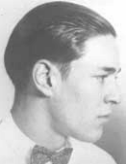
Loeb was the son of a wealthy vice president of Sears Roebuck Company.
Richard Loeb
|
The person who knew Richard Loeb best,
Nathan Leopold, described Loeb as "a man in whom Jekyll and Hyde coexisted at one and
the same moment." According to Leopold, "There wasn't a sunnier, pleasanter,
more likeable character in the whole world," yet Loeb also was a liar, a thief, and a
person for whom right and wrong did not exist. Loeb was the son of a wealthy vice president of Sears Roebuck Company. |
Loeb was unusually intelligent, though not as brilliant as Leopold. His interests ran more to athletics, dancing, and outdoor life than to intellectual pursuits. At age 17, he was the youngest graduate of the University of Michigan. He intended to begin law studies in the fall of 1924.
Contradictory evaluations of Loeb's personality can be found. Most sources describe him as popular and likeable. Leopold described his charm as "magnetic" and said "he was at home with everybody." Some associates of Loeb, on the other hand, described his behavior as "immature", "childish", and "queer."
There were signs before 1924 that not all was right in Loeb's life. He was a heavy drinker by the age of fifteen. He was known to invent stories about affairs with girls. He committed a number of crimes, including the theft of a typewriter from his own fraternity house at Ann Arbor. According to psychiatric testimony, he also seriously contemplated suicide.
Loeb was the instigator of the Franks murder.
|
He was also the actual killer. According to his own statements, he had to spend
several minutes after the murder trying to calm Leopold, who kept saying, "This is
terrible. This is terrible." After discovery of the Franks body, but before his
arrest, Loeb sought out reporters to offer possible theories that might explain the
yet-unsolved crime.
The death
On January 28, 1936, Loeb and Leopold had breakfast together in one of their cells at the prison in Joliet. They spent the rest of the morning correcting papers and working on a math class for the prison school. About 11:30, Loeb left for the shower room with a towel and clean clothes. Shortly thereafter, James Day, Loeb's cellmate, ducked out of the lunch line and into the shower room. Day attacked Loeb with a straight razor, causing 58 wounds. Loeb, naked and covered with blood, staggered out of the shower. Loeb was rushed to the prison hospital for blood transfusions. Leopold watched as prison doctors and two Loeb family physicians tried unsuccessfully to save his friend's life. James Day claimed that the razor cuts were made as he attempted to resist Loeb's sexual advances. Ed Lahey, a reporter for the Chicago Daily News, wrote one of the wittiest leads ever in his story describing Loeb's demise: "Richard Loeb, despite his erudition, today ended his sentence with a proposition." Officials disbelieved Day's version of the events in the shower room and tried him for Loeb's murder. Day was acquitted.